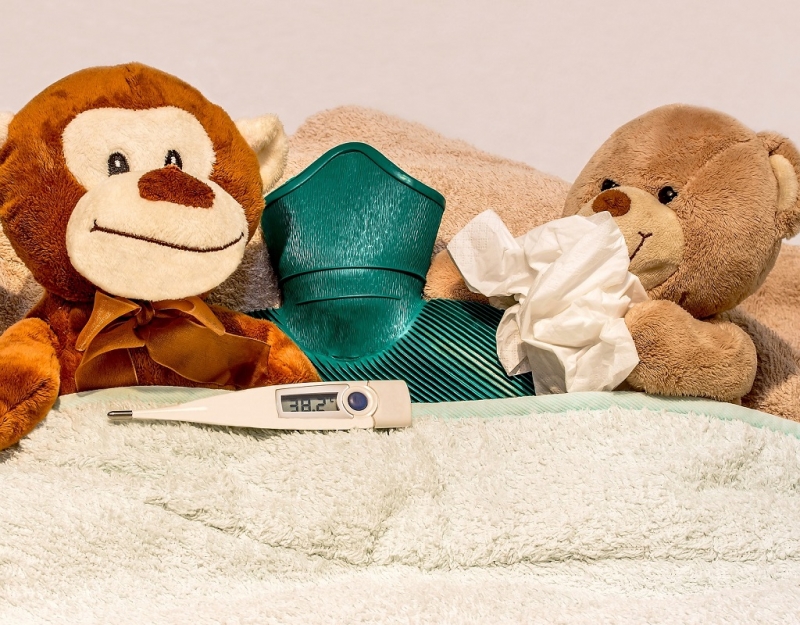During childhood, kids can be struck with a variety of illnesses and viruses. Some have slightly scary names like ‘slap face’ and others can be highly contagious.
But knowing how long to keep littlies away from others when they’re sick can be a bit confusing. Here’s a guide to the most common childhood illnesses, a brief list of their symptoms plus incubation and contagious periods.
Chickenpox (varicella)
Chickenpox is a red and itchy skin rash that usually begins on the torso as small red bumps which look like pimples. These become fluid filled, like blisters, and eventually erupt before scabbing over.
- Incubation: Between 10-20 days after exposure before the rash appears.
- How it’s spread: Through coughing and sneezing, or direct contact with an infected person.
- Infectious: It is highly contagious from a few days before the disease breaks out to, generally speaking, after all the spots scab over – usually about six days.
- Complications: While rare, some children can develop complications like pneumonia, encephalitis or a bacterial infection of the skin.
- Vaccine: Yes.
- Find out more about chickenpox
Whooping cough (pertussis)
Symptoms of whooping cough include long fits of coughing and wheezy breathing.
- Incubation: About 7 days after exposure.
- Infectious: The disease is especially contagious during the first week, however, the infectiousness lessens the following five to seven weeks. Children should be excluded from school for five days after the commencement of antibiotic treatment, and especially kept away from infants who may not have full immunity.
- Complications: Whooping cough is most serious in babies under 12 months of age and often requires admission to hospital. It can lead to complications such as haemorrhage, convulsions, pneumonia, coma, inflammation of the brain, permanent brain damage and long-term lung damage. Around one in every 200 children under six months of age who catches whooping cough will die.
- Vaccine: Yes
- Learn more about whooping cough
Slap face (Fifth disease/parvovirus)
A child with Slap face has red specks on the cheeks, nose, arms, thighs and buttocks which can blur, making it look like your child has been slapped.
- Incubation: About 14 days
- Infectious: Only before the rash appears.
- Complications: While a mild disease for children, there is a small risk to unborn babies if their mother is not immune. Infection during the first 20 weeks of pregnancy can rarely cause a form of anaemia in the baby – but in many cases these resolve before birth.
- Vaccine: No
- Get more information about slap face
Hand, foot and mouth (Coxsackievirus)
A child with hand, foot and mouth has a large number of small spots and blisters, particularly in the mouth and on the feet and hands. The disease can cause a slight fever for a few days.
- Incubation: 2-3 days
- Infectious: The disease is contagious as long as blisters or spots are still present.
- Complications: These are uncommon but can include dehydration because the sores in the mouth and throat make it difficult to drink, or infection of the sores.
- Vaccine: No
- Learn more about hand, foot and mouth
Mumps
- Mumps create a general unwellness including fever and loss of appetite, along with swelling in the salivary glands on one or both sides of the face.
- Incubation: An average of 16 -18 days
- Infectious: 1-2 days before symptoms until about 5 days after.
- Complications: While potentially serious, complications are rare but can include meningitis, encephalitis and, in boys, orchitis in which the testicles can swell.
- Vaccine: Yes, as part of the Measles Mumps Rubella (MMR) combined vaccine.
- Find out more about mumps
Impetigo (school sores)
Impetigo is a skin infection caused by the Staphylococcus or Streptococcus bacteria, impetigo is characterised by small, crusting blisters that usually form on the face or limbs.
- Incubation: 1-3 days after exposure to Streptococcus and 4-10 days after Staphylococcus.
- Infectious: Impetigo is highly contagious – anything that touches the sores has a possibility of transferring the infection to either another person or another part of the body. Oozing sores remain infectious until they are treated.
- Complications: If left untreated, impetigo can lead to skin abscesses.
- Vaccination: No
- Find out more about impetigo
Seasonal flu
Seasonal flu is a respiratory illness with symptoms such as fevers, sore throat, a cough, general achiness, headaches and fatigue.
- Incubation: Usually 1-2 days but can be up to 5.
- Infectious: 1 day before symptoms develop and up to 5-7 days after.
- Complications: Some complications caused by flu include bacterial pneumonia, dehydration, and worsening of chronic medical conditions, such as congestive heart failure, asthma, or diabetes. Children may get sinus problems and ear infections as complications from the flu.
- Vaccine: Yes
- Get more information about seasonal flu
Gastro
Gastroenteritis often includes feelings of nausea, vomiting, cramping and diarrhoea.
- Incubation: 2-4 days after exposure in ingesting.
- Infectious: After symptoms appear, children are usually contagious for about 72 hours. The virus may discharged from the body through vomit or stools for 2 weeks or more after recovery, although it’s unclear whether the virus shed during this time is infectious.
- Complications: There is a risk of severe dehydration – particularly among young children – which can be very serious and will require medical attention, even hospitalisation.
- Vaccine: No
- Learn more about gastro
Common cold
Symptoms of the common cold are characterised by nasal congestion, and can also include a sort throat, cough, irritability and a low-grade fever.
- Incubation: 2-5 days
- Infectious: People are most contagious for the first 2-4 days.
- Complications : Are unlikely but can include ear infections, sinusitis, chest infections and pneumonia.
- Vaccine: No
- Get more information about the common cold
Tonsillitis
Tonsillitis symptoms include a very sore throat, fever, red or pus-covered tonsils and swollen glands in the neck.
- Incubation: 2-4 days
- Infectious: Until 48 hours after starting antibiotics; can be up to 2 weeks without treatment.
- Complications: Not common but tonsillitis can lead to secondary infections in the sinuses or middle ear.
- Vaccine: No
- Find out more about tonsillitis







Leave A Comment
You must be logged in to post a comment.